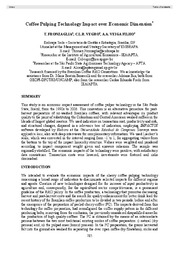Coffee pulping technology impact over economic dimension.
Coffee pulping technology impact over economic dimension.
Author(s): FRONZAGLIA, T.; VEGRO, C. L. R.; VEIGA FILHO, A. A.
Summary: This study is on economic impact assessment of coffee pulper technology in the São Paulo State, Brazil, from the 1990s to 2006. This innovation is an alternative procedure for postharvest preparation of no-washed Brazilian coffees, with relevant advantages on product quality to the point of substituting the Colombian and Central American washed coffees in the blends of largest global roasters. We used indicators on transaction cost, productivity and risk, and structural changes, disposed in a relevance tree of indicators, employing IMPACTOS software developed by Elabora at the Universidade Estadual de Campinas. Surveys were applied in loco, also with deep interviews for complementary information. We used Lieckert?s scale, which was converted in the interval ranging from ?1 to 1, for aggregating values from the bottom to the top of the impact hierarchy structure. Values were weighted and pondered according to impact component weight given and answers cohesion. The sample was regionally stratified. The economic impacts of the technology were positive, with satisfactory data consistence. Transaction costs were lowered, investments were fostered and risks diminished.
Publication year: 2008
Types of publication: Paper in annals and proceedings
Keywords: Avaliação de impacto, Café, Inovação, Multidimensional
Observation
Some of Embrapa's publications are published as ePub files. To read them, use or download one of the following free software options to your computer or mobile device. Android: Google Play Books; IOS: iBooks; Windows and Linux: Calibre.
Access other publications
Access the Agricultural Research Database (BDPA) to consult Embrapa's full library collection and records.
Visit Embrapa Bookstore to purchase books and other publications sold by Embrapa.

